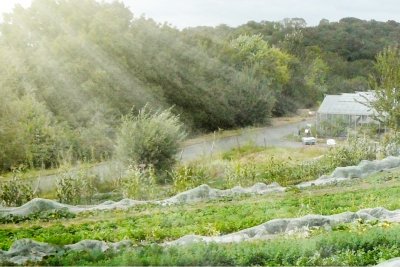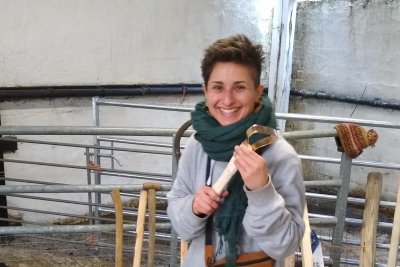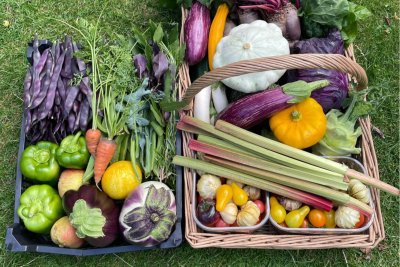Blogs • Sustainable Farming Campaign
Government offers an extra £40m for fruit and veg sector (good), but what’s it for?
This week, the Government offered a package of support for the fruit and veg sector, on the eve of a Farm to Fork Summit of big food and farming businesses at Number 10, focusing on food security. We took a temperature test with several members of the Sustain food and farming alliance. This is what we heard.

On the eve of the UK Farm to Fork Summit, the Prime Minister announced a package of support for British farming, which includes:
- An extra £40m for “a new Horticulture Resilience and Growth offer” (more details below).
- Up to £3 million for small and mobile abattoirs via the Farming Investment Fund.
- A new Agricultural Supply Chain Adjudicator, who will help oversee the enforcement of the Fair Dealing regulations (which Sustain helped to secure in the 2020 Agriculture Act), and a commitment to “introducing regulations to improve fairness in the fresh produce supply chain”.
- £15m for a Farm Gate Food Waste Fund to help farm surplus feed people rather than to animals or anaerobic digesters.
- £50m for horticultural pack-house automation to reduce reliance on migrant labour.
- A range of measures to control animal disease; make water and renewable energy accessible; improve welfare in egg farming; appoint a Commissioner for the Tenant Farming sector; and fund mental health charities to help farmers.
You can read our summary news item on this story here.
Evidence to guide policy priorities in future
The Government also committed to publishing a regular Food Security Index that grabbed the headlines. To our members, this looks helpful but wildly out-of-date given the problems now manifest in our food and farming system and so well documented in the National Food Strategy. The narrow set of 9 indicators to guide policy priorities for the future relate mainly to old-fashioned measures of self-sufficiency, volume, economics and disease. However, the Food Security Index does not track:
- Nutritional security – whether our food supply delivers the balance of good food that we need to eat well and live long and healthy lives, including a shift towards climate-friendly, plant-based food and away from over-consumption of climate-wrecking intensively produced meat and dairy, and ultra-processed foods based on industrial-ingredient crops like soya, maize and sugar.
- Household food security - whether enough of the food supplied is accessible and affordable to all, and how many people are going hungry. This is a measure that Sustain and the Food Foundation have long campaigned for, and the Government has accepted, but is not integrated into this Food Security Index. What kind of 'food security' are we achieving when, in 2024, 15% of UK households are living in food insecurity, skipping meals and unable to afford groceries?
- Environmental security – whether the food production methods are destroying or restoring nature. There is some recognition in the proposed index noting climate change as a ‘longer term’ risk (though ‘immediate risk’ might be more accurate given increasing drought, flooding and fires). As the outgoing Chair of the UK Climate Change Committee Lord Deben wisely said at Sustain’s Annual Conference in 2023: “Without nature, there is no food.” The state of nature should be of central importance to any assessment of true food security, as well as measures of any inputs that may contribute to loss of nature, such as profligate pesticide use.
On food security and nature, read this insightful blog from the Chief Executive of the Royal Society Craig Bennett.
Kath Dalmeny, Chief Executive of the Sustain alliance, said:
"Half of Britain's fruit and veg growers say that their businesses are in peril from pitifully low farmgate prices, labour shortages, unfair trading by supermarkets and the extreme weather experienced over recent years. It's welcome news that the Government has offered some financial and policy support for the fruit and veg industry, but it doesn't come close to the Horticulture Strategy or National Food Strategy that the Government ditched last year. True food security is built on respect and fair trading for farmers, production of food that supports affordable healthy diets, and care for the health of soil, pollinators and a stable climate that make growing food possible."
New money for horticulture - but what's it for?
The Fruit and Vegetable Aid Scheme (an EU scheme) previously made £40m per year available to Producer Organisations (POs) to support groups of growers with collective work on matters such as marketing, adding value and securing routes to market.
The UK Government has doubled this value to £80m, to replace the previous scheme with “a new Horticulture Resilience and Growth offer”, of which £10m will help English orchard growers with equipment, technology and infrastructure to grow fruit.
Sustain member The Landworkers Alliance (LWA) has been a leading and influential voice in the extensive work we all put in to supporting proposals for a Horticulture Strategy (which was unfortunately ditched by the Government last year).
Rebecca Laughton, Horticulture Lead for the Landworkers Alliance, said:
"Fruit and vegetable growers need a roadmap for the next 20 years so that they have security to make long-term investments in soil, equipment, infrastructure and building relationships with customers. A proper Horticulture Strategy would help everyone have confidence that the direction of travel is towards building the sector and transitioning to agroecology and resilient supply chains."
The LWA has welcomed the new boost to funds, but is concerned about how this might be spent. £40m could easily get gobbled up in a few large investments in high-tech volume production benefiting a handful of large businesses, without conditions to require the much-needed transition to agroecological production. The LWA argues that it could be used to focus on targeted investments of benefit to more fruit and veg growers, as well as kick-starting an agroecological market garden renaissance and the local food infrastructure that could help more horticulture businesses and new entrants to flourish and find better routes to market.
Are fruit and veg accessible to everyone?
As the Chief Executive of the Alexandra Rose Charity Jonathan Pauling says:
"The amount of fruit and veg we eat is worryingly low, food-related ill health costs are crippling the NHS, and one of the primary reasons for this is affordability. We are regularly told by families that they cannot afford to buy fruit and veg for themselves and their children, despite wanting to. We urge the Government to look at ways that can support both the UK’s horticulture sector but also increase the accessibility and affordability of fruit and veg for those who need it most."
We are working with the Alexandra Rose Charity and others to pilot ways to make agroecologically grown fruit and vegetables accessible and affordable to everyone as part of the Bridging the Gap programme. This involves removing the barrier of price through providing more money to low-income consumers, food vouchers for agroecologically grown fruit and veg, or buying schemes that put good food onto the public plate in local schools and hospitals. Better systems favour direct and values-led supply chains that are more farmer-focused, or utilising the power of the public purse, which has a duty to support health, equity and the environment, such as through public sector procurement contracts.
The Government's announcement also includes £15m for a Farm Gate Food Waste Fund could potentially help farmers to get paid for the surplus rejected by supermarkets on the basis of cosmetic or questionable technical standards, or simply bad buyer planning. However, there are concerns among our members that such funds could bypass farmer income and simply pay to take the surplus away and continue to embed wasteful buyer practices. If there is surplus, could this be paid for, to help farmers make a better income? Could this also be prioritised for community food enterprise initiatives that build dignity, resilience and jobs in low-income areas, rather than directed to perpetuating emergency food banks? We hope so, and have recently produced a community food enterprise toolkit to promote such approaches with social investors building routes out of poverty.
Will fruit and veg growers get a fair deal?
The Government’s announcement contains a commitment to “support farmers to get a fair price for their products by laying new regulations in Parliament for eggs, fresh produce and pigs, ensuring they have reasonable and transparent contracts”. This sounds promising.
Powers to regulate the supply chain were strengthened in the 2020 UK Agriculture Act with a Fair Dealing Obligation. As the Grocery Code Action Network highlights (of which Sustain was a founding member), we are yet to see these powers being adequately exercised to prevent avoidable on-farm waste, unfairly managed or cancelled contracts, and the eye-watering price squeeze that sees farmers get less than 1p in profit per typical pack of everyday foods.
More money for small abattoirs
This article focuses mainly on fruit and veg, but it's worth noting that "up to £3 million" has been made available for small and mobile abattoirs via the Farming Investment Fund. We take our hats off to Sustain alliance member the Sustainable Food Trust for tirelessly keeping this vital aspect of local food infrastructure on the policy agenda.
Published Wednesday 15 May 2024
Sustainable Farming Campaign: Sustain encourages integration of sustainable food and farming into local, regional and national government policies.





